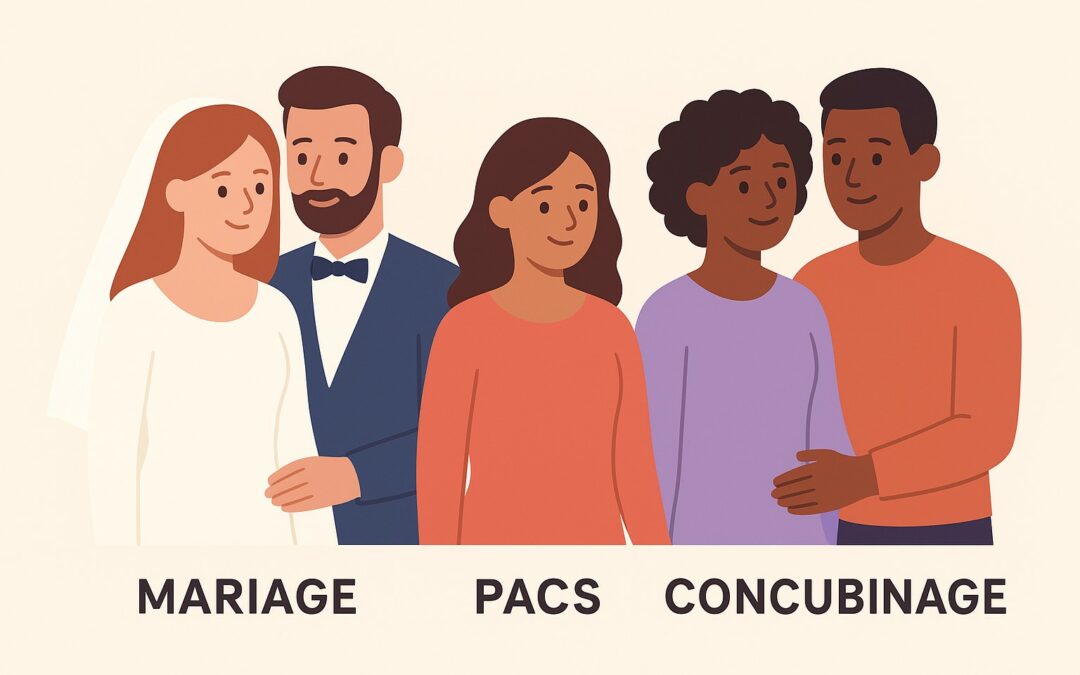Life as a couple in France can take different legal forms: marriage, civil partnership (PACS), or cohabitation.
Each status creates specific rights and obligations.
This article provides a clear overview to help you understand the practical and legal implications of each option.
1. Definitions and Legal Nature
1.1. Marriage
Marriage is a formal legal act, both an institution and a contract, that creates a legal status between spouses as defined by civil law.
It entails strong commitments, with significant property and personal effects (mutual duties, inheritance rights, protection of the family home, etc.).
1.2. Civil Partnership (PACS)
A PACS is a contract concluded between two adults — of the same or different sex — to organize their shared life.
It is characterized by its flexibility and its simple procedure for both formation and dissolution, but it does not provide the same rights and duties as marriage.
1.3. Cohabitation
Cohabitation is a de facto union, characterized by a stable and continuous shared life between two people, with no formal legal procedure required.
2. Rights and Obligations: Comparative Table
|
Status |
Formation Procedure |
Reciprocal Duties |
Default Property Regime |
Protection upon Separation |
Inheritance Rights |
|
Marriage |
Civil ceremony at City Hall |
Fidelity, support, assistance, cohabitation (Civil Code Art. 212+) |
Matrimonial regime (community or separation of property) |
Compensatory allowance, survivor’s pension, property division |
Yes (reserved heir) |
|
PACS |
Declaration at City Hall |
Material support, assistance, joint responsibility for household debts |
Separation of property (default, joint ownership optional) |
No compensatory allowance, simple termination, limited rights |
No (unless by will) |
|
Cohabitation |
None |
No legal duty (mutual respect only) |
No specific property regime (except jointly owned assets) |
No compensatory allowance, each keeps own property |
No (unless by will) |
3. Property, Debt, and Taxation
3.1. Marriage
-
-
- Matrimonial regime: Legal community of property or separation of property if chosen.
- Joint liability: Spouses are jointly liable for household debts and certain taxes (income tax, residence tax — CGI Art. 1691 bis).
-
3.2. PACS
-
-
- Property regime: Separation of property by default since 2007, with the option to choose joint ownership.
- Joint liability: Partners are jointly liable for debts incurred for daily needs and jointly responsible for certain taxes.
-
Since Law 2024-494 of May 31, 2024 (effective June 2, 2024), married couples or PACS partners can request full or partial release from joint tax liability in the event of separation, making post-breakup financial management easier.
3.3. Cohabitation
-
-
- No legal framework for property or debts: each partner remains owner of their own assets, except for jointly owned property. No automatic joint liability for debts.
-
4. Social Protection, Inheritance, and Succession
-
-
- Marriage: Full social protection (survivor’s pension, automatic inheritance rights, etc.).
- PACS: No automatic inheritance rights — a will is required to pass on assets to the partner.
- Cohabitation: No inheritance or social protection, except through specific arrangements made by the partners (wills, beneficiary clauses).
-
5. Breakup: Procedures and Consequences
-
-
- Marriage: Judicial divorce or divorce by mutual consent, formal procedure with legal and financial consequences (compensatory allowance, property division, etc.).
- PACS: Terminated by a simple joint declaration or unilateral decision, no court involvement required, and no right to compensatory allowance.
- Cohabitation: No formal procedure — either party can end the relationship at any time without legal effect.
-
In the event of a PACS or cohabitation breakup, the family judge can grant temporary allocation of the family home (up to 6 months) if there are children.
The judge can also determine parental authority arrangements (child’s residence, visitation, child support) if there is disagreement or domestic violence.
6. Key Takeaways: Which Option to Choose?
-
-
- Marriage: Ideal for those seeking maximum protection (inheritance, social rights, financial solidarity), a comprehensive legal framework, and strong social recognition.
- PACS: Suitable for couples wanting a flexible, easily reversible legal arrangement with intermediate rights but less protection than marriage, especially in the event of death.
- Cohabitation: Offers the most freedom with no legal obligations but no protection in case of separation or death.
-
Conclusion
The choice between marriage, PACS, and cohabitation depends on the partners’ intentions, their life plans, the level of protection they desire, and the legal consequences they are willing to assume.
Personalized legal advice from a family law attorney is strongly recommended to make the choice best suited to your situation.
For any questions or specific situations, do not hesitate to schedule an appointment.
© Photo : AI
